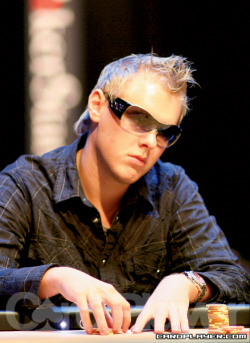






Søren KongsgaardCrown Prince of Denmarkby Craig Tapscott | Published: Mar 01, 2008 |
|
|
Last autumn, Danish professional Søren Kongsgaard relocated to sunny Barcelona, Spain, but he may as well have called Full Tilt Poker home sweet home. In November, he finished second in the Full Tilt Online Poker Series $2,500 no-limit hold'em event for $261,750. Three weeks earlier, he also had been the runner-up in a $500 Sunday event for $121,588. In the latter event, he was disconnected during heads-up play, eventually blinding out and losing to Chris "BluffMagCV" Vaughan. But that second-place finish was short-lived.
In the middle of November, Kongsgaard posted on a poker forum that he had received an e-mail from a Full Tilt investigation team, declaring him the winner and awarding him the $197,000 first prize. The winner had logged out and allowed a player who had been eliminated earlier in the event to take over the account. Clearly, Kongsgaard is living a charmed life.
"I've had the luck when I've been deep in a lot of tournaments," said Kongsgaard with a sheepish grin. "If you ask Danish poker players about the reason for my success, almost everyone will answer that I'm sick lucky."
Luck can't be the only reason for his huge success in 2007. Last year, Kongsgaard proved his prowess in the live-tournament arena, as well. He placed third in the European Poker Tour Monte Carlo grand final for $814,000, and took down the Danish Poker Championships for $234,000. Card Player recently caught up with the 20-year-old phenom to discuss his stunning tournament success.
Craig Tapscott: What's the main reason for your success at such a young age?
 Søren Kongsgaard: I've been very willing to spend a lot of hours studying the game. I have read a lot of books, watched a lot of poker videos, and played a lot of hours. A lot of people do that, but I guess I have some kind of talent for the game. I hope that does not sound as if I'm arrogant.
Søren Kongsgaard: I've been very willing to spend a lot of hours studying the game. I have read a lot of books, watched a lot of poker videos, and played a lot of hours. A lot of people do that, but I guess I have some kind of talent for the game. I hope that does not sound as if I'm arrogant.
CT: What is your plan in these huge-field events? Share your strategies during the beginning, middle, and endgame.
SK: I don't really play them with a special strategy. I start out pretty tight, trying to flop a set and get paid off. Small suited connectors and A-K are not hands I like when the stacks are deep. In the middle, I try to get a read on my opponents, trying to find situations where it's possible to pick up small pots uncontested. Later, I play hyperaggressively and try to bully the table if the stacks and my opponents allow me to. When you get deep into these big-field tournaments with huge prizes, a lot of players get scared. Then you have a chance to build a chip lead, which means that you can double up a shorter stack and still be alive if your aggressive tactic backfires.
CT: Tell us about the importance of stealing blinds?
SK: In the early stages, I seldom raise with marginal hands from late position when it's folded to me. There is just no reason to jeopardize your stack just to pick up a few chips. Later in tournaments, it's crucial to pick up the small pots. If you play only the biggest hands, you very seldom get action because of your tight image. And when you pick up a pot only once in every two orbits, your stack will be in bad shape quickly.
CT: Do you respect button raises anymore?
SK: Again, it depends on the player. It's common knowledge that you can raise with marginal hands from late position, but he also knows that you know that. It creates a deeper level of thinking, but I often like to make a resteal to get some respect back at the table and not just let myself be run over.
CT: Whom are you looking to take advantage of at the table?
SK: In the beginning of tournaments, I look for the overaggressive and passive donks. Later in the tournament, I try to take advantage of the weak and scared players and pick up pots uncontested.
CT: What situations give you the most trouble?
SK: Right now, I'm trying to work out how important it is to stay alive in a tournament. What are the odds you need to take a 50-50 flip, and so on. I think it's pretty difficult to work out.
CT: Any advice for beginning or intermediate players?
SK: Do not start to play poker seriously because of the fame and fortune. If you don't have the passion for the game, it's impossible to reach the skies. But if you work hard and have self-control, it's possible to make a decent living from poker. 